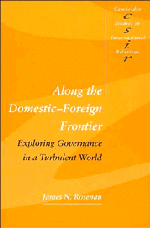Book contents
- Frontmatter
- Contents
- List of figures and tables
- Preface
- Acknowledgments
- Part I Intellectual contexts
- Part II Global contexts
- Part III Societal contexts
- Part IV Actors
- Part V Conclusions
- 21 Democracy
- 22 War and peace
- 23 Exploring governance in a turbulent world
- Epilogue
- Index
- CAMBRIDGE STUDIES IN INTERNATIONAL RELATIONS
23 - Exploring governance in a turbulent world
Published online by Cambridge University Press: 19 January 2010
- Frontmatter
- Contents
- List of figures and tables
- Preface
- Acknowledgments
- Part I Intellectual contexts
- Part II Global contexts
- Part III Societal contexts
- Part IV Actors
- Part V Conclusions
- 21 Democracy
- 22 War and peace
- 23 Exploring governance in a turbulent world
- Epilogue
- Index
- CAMBRIDGE STUDIES IN INTERNATIONAL RELATIONS
Summary
The old is dying, the new is being born, and in the interregnum there are many morbid symptoms.
Antonio GramsciSo, is the coming of international government now logically unstoppable? Yes, but it will advance with much difficulty, because two of the three ingredients of the rise of the nation-state – identity and legitimacy – are still missing at the higher level. While the principle of noninterference in the affairs of nation-states may be weakening, the willingness of people to die to impose the world's standards is weakening, too.
The juxtaposition of these epigraphs serves as a good basis for concluding this book. The first summarizes the essential theme that change is pervasive, that something “new is being born' while the second suggests that effective governance along the Frontier may eventually emerge out of the “old.” Yet, neither epigraph ignores the difficulties that must be confronted as the world moves out of one epoch and into another. Gramsci posits the transition as pervaded with morbid moments, while Colchester notes huge obstacles to the emergence of global governance.
Taken together, moreover, the two epigraphs highlight the frustrations inherent in exploring frontiers. For all the dimensions of a frontier that yield to the explorer's tools and become familiar terrain, in the process new dimensions are opened up that require further exploration. Just as the earth's last geographic frontiers began to be meaningfully charted, for example, so did humankind turn toward exploration of outer space.
- Type
- Chapter
- Information
- Along the Domestic-Foreign FrontierExploring Governance in a Turbulent World, pp. 439 - 449Publisher: Cambridge University PressPrint publication year: 1997
- 4
- Cited by

